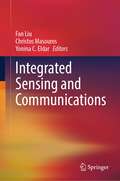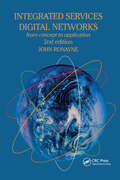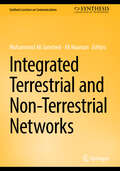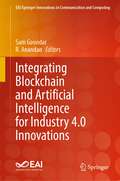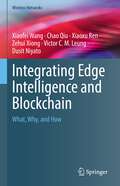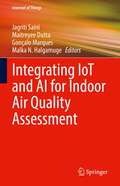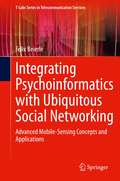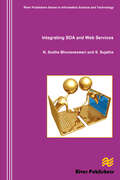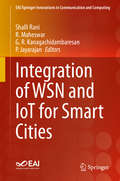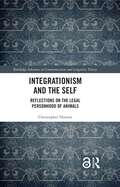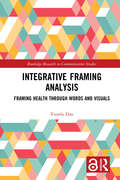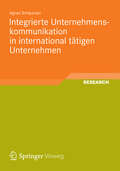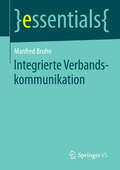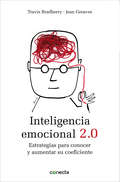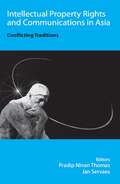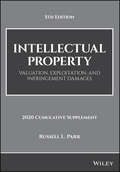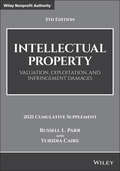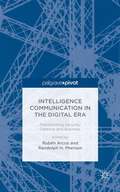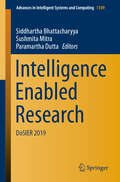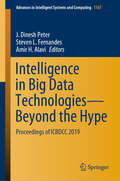- Table View
- List View
Integrated Sensing and Communications
by Yonina C. Eldar Fan Liu Christos MasourosThe coming generations of wireless network technologies will serve, not only as a means of connecting physical and digital environments, but also to set the foundation for an intelligent world in which all aspects are interconnected, sensed, and endowed with intelligence. Beyond merely providing communication capabilities, future networks will have the capacity to "see" and interpret the physical world. This development compels us to re-imagine the design of current communication infrastructures and terminals, taking into account crucial aspects such as fundamental constraints and tradeoffs, information extraction and processing technologies, issues of public security and privacy, as well as the emergence of numerous new applications. This field of research is known as Integrated Sensing and Communications (ISAC), and it has ushered in a paradigm shift towards the omnipresence of radio devices.This book provides the first comprehensive introduction to the ISAC theoretical and practical framework. Each chapter is authored by a group of world-leading experts, including over 10 IEEE Fellows. Readers can expect to gain both a broad overview and detailed technical insights into the latest ISAC innovations.
Integrated Services Digital Network: From Concept To Application
by J RonayneAn introduction to "ISDN" which brings the technology up-to-date, incorporating developments in "ATM", "SDH" and Broadband "ISDN". This book is suitable for self-learning communications professionals and applied courses in communications management and technology, and advanced undergraduates and graduates in computing and electronics.
Integrated Terrestrial and Non-Terrestrial Networks (Synthesis Lectures on Communications)
by Muhammad Ali Jamshed Ali NaumanThis book aims to address a wide range of topics in wireless/satellite communications to tackle the issues related to the integration of terrestrial networks (TN) with non-terrestrial networks (NTN). In Release 17, the third-generation partnership project (3GPP) proposed the standardization of NTN to allow 5G-based TN to support NTN. According to Release 17, the NTN will consist of satellites, with unmanned aerial vehicles (UAVs) and high-altitude platforms (HAPs) regarded as specific use cases of NTN. Similar to the Global Positioning System (GPS), signals based on NTN are unable to provide indoor coverage, as these signals are attenuated and scattered by roofs, walls, etc. Moreover, power and delay are critical factors that restrict a cellular-enabled mobile handset from achieving reliability, seamless coverage, and low latency while relying on NTN. This book has brought together multidisciplinary contributors in the field of wireless/satellite communications to identify and present technical challenges and recent results related to the design of energy-efficient, delay-tolerant, and enhanced coverage-based integrated TN and NTN. Given that challenges and future aspects are also considered, the book covers a wide variety of subject categories and would therefore benefit a larger readership in the scientific community.
Integrating Artificial Intelligence and IoT for Advanced Health Informatics: AI in the Healthcare Sector (Internet of Things)
by Carmela Comito Agostino Forestiero Ester ZumpanoThe book covers the integration of Internet of Things (IoT) and Artificial Intelligence (AI) to tackle applications in smart healthcare. The authors discuss efficient means to collect, monitor, control, optimize, model, and predict healthcare data using AI and IoT. The book presents the many advantages and improvements in the smart healthcare field, in which ubiquitous computing and traditional computational methods alone are often inadequate. AI techniques are presented that play a crucial role in dealing with large amounts of heterogeneous, multi-scale and multi-modal data coming from IoT infrastructures. The book is intended to cover how the fusion of IoT and AI allows the design of models, methodologies, algorithms, evaluation benchmarks, and tools can address challenging problems related to health informatics, healthcare, and wellbeing.
Integrating Blockchain and Artificial Intelligence for Industry 4.0 Innovations (EAI/Springer Innovations in Communication and Computing)
by Sam Goundar R. AnandanThis book discusses the convergence of artificial intelligence (AI) and Blockchain and how they can work together to help reach the goals of Industry 4.0. The authors first discuss how AI and Blockchain can help increase performance in business. The authors go on to discuss how the technologies can integrate to provide a competitive edge for businesses through improvements in big data, which has allowed firms to organize huge datasets into structured components that computers can process quickly. The authors also cover security implications and how AI and Blockchain can act as a double-edged sword against cyber-attacks. Impacts in programming, calculations, robotization, robots, and equipment are also discussed. This book caters to an extensive cross-sectional and multi-disciplinary readership. Academics, researchers and their students in topics such as artificial intelligence, cyber-physical systems, ethics, robotics, safety engineering, and safety-critical systems should find the book of value.
Integrating Edge Intelligence and Blockchain: What, Why, and How (Wireless Networks)
by Dusit Niyato Xiaofei Wang Victor C. Leung Chao Qiu Xiaoxu Ren Zehui XiongThis book examines whether the integration of edge intelligence (EI) and blockchain (BC) can open up new horizons for providing ubiquitous intelligent services. Accordingly, the authors conduct a summarization of the recent research efforts on the existing works for EI and BC, further painting a comprehensive picture of the limitation of EI and why BC could benefit EI. To examine how to integrate EI and BC, the authors discuss the BC-driven EI and tailoring BC to EI, including an overview, motivations, and integrated frameworks. Finally, some challenges and future directions are explored. The book explores the technologies associated with the integrated system between EI and BC, and further bridges the gap between immature BC and EI-amicable BC.Explores the integration of edge intelligence (EI) and blockchain (BC), including their integrated motivations, frameworks and challenges;Presents how BC-driven EI can realize computing-power management, data administration, and model optimization;Describes how to tailor BC to better support EI, including flexible consensus protocol, effective incentive mechanism, intellectuality smart contract, and scalable BC system tailoring;Presents some key research challenges and future directions for the integrated system.
Integrating IoT and AI for Indoor Air Quality Assessment (Internet of Things)
by Malka N. Halgamuge Maitreyee Dutta Gonçalo Marques Jagriti SainiThis book presents Internet of Things (IoT) solutions monitoring and assessing a variety of applications areas for indoor air quality (IAQ). This book synthesizes recent developments, presents case studies, and discusses new methods in the area of air quality monitoring, all the while addressing public health concerns. The authors discuss the issues and solutions, including IoT systems that can provide a continuous flow of data retrieved from cost-effective sensors that can be used in multiple applications.The authors present the leading IoT technologies, applications, algorithms, systems, and future scope in this multi-disciplinary domain.
Integrating Psychoinformatics with Ubiquitous Social Networking: Advanced Mobile-Sensing Concepts and Applications (T-Labs Series in Telecommunication Services)
by Felix BeierleThis book deepens the understanding of people through smartphone data obtained via mobile sensing and applies psychological insights for social networking applications. The author first introduces TYDR, an application for researching smartphone data and user personality. A novel, structured privacy model for mobile sensing applications is developed and the obtained empirical results help researchers gauge what data they can expect users to share in daily-life studies. The new research findings, the concept of mobile sensing, and psychological insights about the formation and structure of real-life social networks are integrated into the field of social networking. Finally, for this novel integration, the author presents concepts, decentralized software architectures, and fully realized prototypes that recommend new contacts, media, and locations to individual users and groups of users.
Integrating SOA and Web Services
by S. Sujatha N. Sudha BhuvaneswariThis book highlights how to integrate and realize Service Oriented Architecture with web services which is one of the emerging technologies in IT. It also focuses on the latest technologies, such as Metadata Management, Security issues, Quality of Service and its commercialization.
Integrating Social Media into Information Systems: Requirements, Gaps, and Potential Solutions (G - Reference, Information and Interdisciplinary Subjects)
by Parisa Roshan Isaac R. Porche III Ryan Andrew Brown Astrid Stuth Cevallos Osonde A. Osoba Joshua Mendelsohn Douglas Douglas Yeung John Bordeaux Timothy R. Gulden Laura Kupe Luke J. Matthews Katharine Sieck Sarah SolimanThis report examines the technical challenges associated with incorporating bulk, automated analysis of social media information into procedures for vetting people seeking entry into the United States. The authors identify functional requirements and a framework for operational metrics for the proposed social media screening capabilities and provide recommendations on how to implement those capabilities.
Integration Through Law: ASEAN as an Actor in International Fora
by Jürgen Rüland Nguitragool, Paruedee and Rüland, Jürgen Paruedee NguitragoolASEAN as an Actor in International Fora addresses a blind spot in ASEAN research and in comparative regionalism studies by assessing why, how, when and to what extent ASEAN member governments achieve a collective presence in global fora. Written for academic researchers and practitioners working in areas such as international relations, political science and international law, it examines ASEAN's negotiating behavior with a novel four-point cohesion typology. The authors argue that ASEAN's 'cognitive prior' and its repository of cooperation norms have affected ASEAN's negotiation capacities, formats, strategies and cohesion in international fora. Using two case studies - one on ASEAN's cohesion in the WTO agricultural negotiations and one on UN negotiations on forced labor in Myanmar - they examine ASEAN's collective actions at different stages of negotiation, in different issue areas and in different negotiating fora. The book concludes by providing recommendations for strengthening ASEAN's international negotiation capacities.
Integration of Unmanned Aerial Vehicles in Wireless Communication and Networks: UAVs and 5G (Unmanned System Technologies)
by Rui Dinis Stefan Panic Dushantha Nalin K Jayakody P. MuthuchidambaranathanThis book presents a comprehensive overview of Unmanned Arial Vehicles (UAV) and their integration of wireless communications and networks, including inherent challenges and open access concerns. The authors present the latest technologies associated with UAV-assisted wireless communications and networks by linking their association with 5G Wireless Networks. The authors include positioning of UAV, coagulation attack of UAV, and the green prospective of UAV communication systems. The book explains how the UAV can be integrated with 5G wireless schemes such as ultra-reliable, low density communications, full duplex, and non-orthogonal multiple access (NOMA) for 5G. This book targets graduate students, researchers, and industry personnel.
Integration of WSN and IoT for Smart Cities (EAI/Springer Innovations in Communication and Computing)
by Shalli Rani R. Maheswar G. R. Kanagachidambaresan P. JayarajanThis book exploits the benefits of integration of wireless sensor networks (WSN) and Internet of Things (IoT) for smart cities. The authors discuss WSN and IoT in tackling complex computing tasks and challenges in the fields of disaster relief, security, and weather forecasting (among many others). This book highlights the challenges in the field of quality of service metrics (QoS) in the WSN based IoT applications. Topics include IoT Applications for eHealth, smart environments, intelligent transportation systems, delay tolerant models for IoT applications, protocols and architectures for industrial IoT, energy efficient protocols, and much more. Readers will get to know the solutions of these problems for development of smart city applications with the integration of WSN with IoT.
Integrationism and the Self: Reflections on the Legal Personhood of Animals (Routledge Advances in Communication and Linguistic Theory)
by Christopher HuttonIn recent years a set of challenging questions have arisen in relation to the status of animals; their treatment by human beings; their cognitive abilities; and the nature of their feelings, emotions, and capacity for suffering. This ground-breaking book draws from integrational semiology to investigate arguments around the rights of certain animals to be recognized as legal persons, thereby granting them many of the protections enjoyed by humans. In parallel with these debates, the question of the legal personality of artificial intelligence (AI) systems has moved to the forefront of legal debate, with entities such as robots, cyborgs, self-driving cars, and genetically engineered beings under consideration. Integrationism offers a framework within which the wider theoretical and practical issues can be understood. Law requires closure and categorical answers; integrationism is an open-ended form of inquiry that is seen as removed from particular controversies. This book argues that the two domains can be brought together in a challenging and productive synthesis. A much-needed resource to examine the heart of this fascinating debate and a must-read for anyone interested in semiology, linguistics, philosophy, ethics, and law.
Integrative Framing Analysis: Framing Health through Words and Visuals (Routledge Research in Communication Studies)
by Viorela DanMuch of framing scholarship focuses either exclusively on the analysis of words or of visuals. This book aims to address this gap by proposing a six-step approach to the analysis of verbal frames, visual frames and the interplay between them—an integrative framing analysis. This approach is then demonstrated through a study investigating the way words and visuals are used to frame people living with HIV/AIDS in various communication contexts: the news, public service announcements and special interest publications. This application of integrative framing analysis reveals differences between verbal frames and visual frames in the same messages, underscoring the importance of looking at these frames together.
Integrierte Unternehmenskommunikation in international tätigen Unternehmen
by Agnes SchipanskiAgnes Schipanski entwickelt auf Basis einer umfangreichen Literaturanalyse ein umfassendes Modell der international integrierten Unternehmenskommunikation, das transnational orientiert ist. Dabei spielen Managementfunktionen, die transnationale und transkulturelle Strategie sowie die Prozessorganisation eine zentrale Rolle. Kern des Modells ist ein Reorganisationsprozess, dessen Ergebnis eine transnational modulare Kommunikationsorganisation mit Netzwerkcharakter ist. Sie zeichnet sich durch modulare Organisationseinheiten, die Dezentralisierung von strategischen Entscheidungskompetenzen und ein integriertes Kommunikationsnetzwerk aus. Das Modell wendet die Autorin auf das internationale Landtechnikunternehmen CLAAS in Form einer Feldstudie, Einzelfallanalysen und Vergleichsstudien an.
Integrierte Verbandskommunikation (essentials)
by Manfred BruhnVerbände haben sich mit einer Vielzahl unterschiedlicher Anspruchsgruppen auseinanderzusetzen. Zudem existieren verschiedene Möglichkeiten der Kommunikation bzw. der Zielgruppenansprache. Die Relevanz einer Integrierten Kommunikation über alle Kommunikationsinstrumente ist daher unbestritten. Der Beitrag zeigt auf, wie die Besonderheiten der Verbandskommunikation im Rahmen einer Integrierten Kommunikation Berücksichtigung finden. Zudem werden Erfolgsbeispiele von Verbänden aufgezeigt, die eine effektive und effiziente Integrierte Kommunikation erfolgreich in der Praxis umsetzen.
Inteligencia emocional 2.0
by Travis Bradberry Jean GreavesCasi todo el mundo sabe que la inteligencia emocional es un factor crítico en el éxito profesional y personal. Pero conocer lo que es la inteligencia emocional no es lo mismo que saber cómo emplearla para mejorar y avanzar profesionalmente. Inteligencia Emocional 2.0 ofrece un programa paso a paso para aumentar tu inteligencia emocional, potenciando cuatro habilidades fundamentales: el autoconocimiento, el control personal, el conocimiento social y la gestión de las relaciones.
Intellectual Property Rights and Communications in Asia: Conflicting Traditions
by Pradip Ninan Thomas and Jan ServaesThis volume explores the contested nature of the ownership of knowledge and access to it in Asia. It offers insights into solving some of the key issues related to intellectual property (IP) and communication in the contemporary world. With the ownership of IP becoming a core feature of media/information industries and state policy, issues related to access to knowledge and its use have become a matter of critical concern. While trade regimes, the state and the core cultural and information industries have begun to advocate greater scope for a variety of knowledge enclosures, civil society is increasingly arguing for a people-centered vision of knowledge futures. This vision includes the need for equity-based and flexible licensing regimes; the legitimacy of local solutions to IP related issues; support for cultural diversity; and access to knowledge based on need rather than the ability to pay for knowledge. This book explores these important issues, supported by case studies from the Asian region. It presents an extensive picture of a dynamic and complex process that reveals some of the dilemmas of the digital age.
Intellectual Property: Valuation, Exploitation, and Infringement Damages, 2020 Cumulative Supplement (Wiley Nonprofit Authority)
by Russell L. ParrA new edition of the trusted book on intellectual property Intellectual Property simplifies the process of attaching a dollar amount to intellectual property and intangible assets, be it for licensing, mergers and acquisitions, loan collateral, investment purposes, and determining infringement damages. This book comprehensively addresses IP Valuation, the Exploitation Strategies of Licensing and Joint Ventures, and determination of Infringement Damages. The author explains commonly used strategies for determining the value of intellectual property, as well as methods used to set royalty rates based on investment rates of returns. Key concepts are brought to life through real-world examples of exploitation strategies being used by major corporations.
Intellectual Property: Valuation, Exploitation, and Infringement Damages, 2021 Cumulative Supplement (Wiley Nonprofit Authority)
by Russell L. Parr Yuridia CaireStay completely up to date in a critical and rapidly evolving area of law The 2021 Cumulative Supplement to the fifth edition of Intellectual Property: Valuation, Exploitation, and Infringement Damages delivers the latest legal and regulatory changes affecting industry participants. The Supplement offers readers the opportunity to remain fully up to date in a fast-moving and quickly changing area of law applicable to anyone who operates in the commercial sector. Perfect for legal professionals, consultants, entrepreneurs, company founders, and other business leaders, the 2021 Cumulative Supplement to Intellectual Property: Valuation, Exploitation, and Infringement Damages, Fifth Edition is an indispensable resource for any professional impacted by the law of intellectual property.
Intellektuelles Kapital in deutschen Non-Profit-Organisationen: Eine empirische Studie
by Katrin BlankenburgDieses Buch beschreibt, wie Non-Profit-Organisationen (NPOs) kommunizieren, was sie ausmacht, Erfolg signalisieren und Nachhaltigkeit zeigen, um Stakeholder davon zu überzeugen, wichtige Ressourcen bereitzustellen. Einen lohnenswerten Ansatz bieten Berichte zum intellektuellen Kapital. Auf der Grundlage empirischer Untersuchungen zeigt das Buch auf, welche Ressourcen für NPOs unverzichtbar sind, welche Anforderungen an Organisationen gestellt werden und welche Abhängigkeiten zwischen diesen Ressourcen und Anforderungen bestehen. Diese Erkenntnisse helfen gemeinnützigen Organisationen, die notwendigen Informationen bereitzustellen und dabei die Offenlegung auf ein Minimum zu beschränken, um mögliche Wettbewerbsvorteile nicht zu verschenken. Des Weiteren wird der Status quo der Offenlegung von IK in Deutschland dargestellt und ein theoretischer Rahmen für die Motivation von NPOs, Informationen über ihre IK offenzulegen, vorgestellt. Diese Ergebnisse bilden eine solide Grundlage für weitere Forschungen. Schließlich wird ein Rahmen für die Offenlegung von intellektuellem Kapital zur Unterstützung von Praktikern bereitgestellt.
Intelligence Communication in the Digital Era: Transforming Security, Defence and Business
by Randolph H. Pherson Rubén ArcosThis edited volume argues that producers of analysis need to shift from producing static, narrative products to much more dynamic, digitally-based platforms in order to remain competitive and relevant.
Intelligence Enabled Research: DoSIER 2019 (Advances in Intelligent Systems and Computing #1109)
by Siddhartha Bhattacharyya Paramartha Dutta Sushmita MitraThis book gathers extended versions of papers presented at DoSIER 2019 (the First Doctoral Symposium on Intelligence Enabled Research, organized by RCC Institute of Information Technology, Kolkata, India). The papers address the rapidly expanding research area of computational intelligence, which, no longer limited to specific computational fields, has since made inroads in signal processing, smart manufacturing, predictive control, robot navigation, smart cities, and sensor design, to name but a few. Presenting chapters written by experts active in these areas, the book offers a valuable reference guide for researchers and industrial practitioners alike, and will inspire future studies.
Intelligence in Big Data Technologies—Beyond the Hype: Proceedings of ICBDCC 2019 (Advances in Intelligent Systems and Computing #1167)
by J. Dinesh Peter Amir H. Alavi Steven L. FernandesThis book is a compendium of the proceedings of the International Conference on Big-Data and Cloud Computing. The papers discuss the recent advances in the areas of big data analytics, data analytics in cloud, smart cities and grid, etc. This volume primarily focuses on the application of knowledge which promotes ideas for solving problems of the society through cutting-edge big-data technologies. The essays featured in this proceeding provide novel ideas that contribute for the growth of world class research and development. It will be useful to researchers in the area of advanced engineering sciences.
